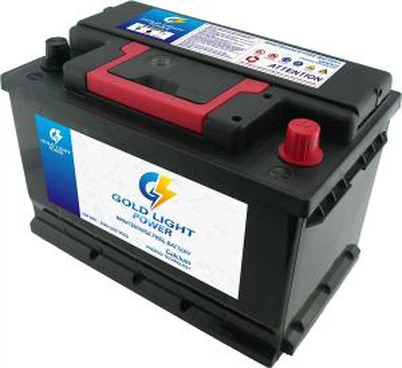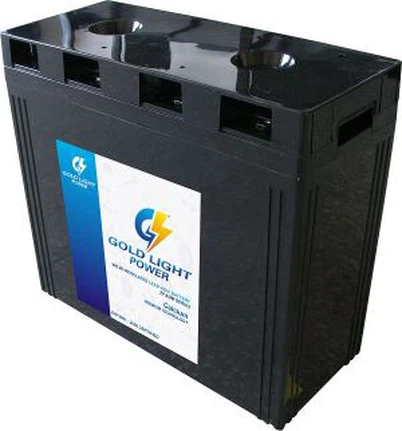Can I use a 2 volt battery in a flashlight?
Leave a message
Can I use a 2 volt battery in a flashlight?
As a 2-volt battery supplier, I often encounter customers with questions about the compatibility of 2-volt batteries with various devices, especially flashlights. This blog aims to comprehensively explore whether it's feasible to use a 2-volt battery in a flashlight, delving into the technical aspects, advantages, potential drawbacks, and real - world applications.
Technical Considerations
To determine if a 2-volt battery can be used in a flashlight, we first need to understand the basic electrical requirements of flashlights. Flashlights typically require a specific voltage to power their bulbs or LED lights. Most common household flashlights are designed to work with standard battery configurations such as AA (1.5 volts) or AAA (1.5 volts) batteries. These flashlights are engineered to operate efficiently within a certain voltage range.
A 2-volt battery has a higher voltage than a single 1.5 - volt AA or AAA battery. If a flashlight is designed to operate with a single 1.5 - volt battery, using a 2 - volt battery might supply more voltage than the flashlight's circuitry can handle. This can lead to overheating of the flashlight components, potentially damaging the bulb or LED, and even causing a short - circuit in extreme cases.
On the other hand, some high - power flashlights are designed to work with multiple batteries connected in series. For example, if a flashlight is designed to use two AA batteries in series (providing a total of 3 volts), a single 2 - volt battery may not supply enough voltage to power the flashlight effectively. The light output may be dim, and the flashlight may not function at its optimal level.
However, there are also specialized flashlights that are designed to work with 2 - volt batteries. These flashlights are engineered with circuitry that can handle the specific voltage of 2 - volt batteries. They often have voltage regulators or other components that ensure the proper functioning of the flashlight even when powered by a 2 - volt source.
Advantages of Using 2 - Volt Batteries in Flashlights
One of the main advantages of using 2 - volt batteries in flashlights is their higher energy density. Compared to standard 1.5 - volt batteries, 2 - volt batteries can store more energy per unit volume. This means that a flashlight powered by a 2 - volt battery may have a longer runtime. For example, in situations where you need a flashlight for extended periods, such as during camping or emergency situations, a 2 - volt battery can provide a more reliable power source.
2 - volt batteries also tend to have a more stable voltage output over their discharge cycle. This results in a more consistent light output from the flashlight. Unlike some 1.5 - volt batteries that may experience a significant drop in voltage as they discharge, 2 - volt batteries can maintain a relatively constant voltage, ensuring that the flashlight remains bright throughout its use.
Another advantage is the durability of 2 - volt batteries. Many 2 - volt batteries, such as lead - acid batteries, are designed to withstand multiple charge - discharge cycles. This makes them a cost - effective option in the long run, especially for users who frequently use their flashlights.
Potential Drawbacks
As mentioned earlier, the main drawback of using 2 - volt batteries in flashlights is the compatibility issue. Not all flashlights are designed to work with 2 - volt batteries. If you try to use a 2 - volt battery in an incompatible flashlight, you risk damaging the flashlight and potentially causing a safety hazard.
2 - volt batteries are also often larger and heavier than standard 1.5 - volt batteries. This can make the flashlight bulkier and less portable. For users who need a lightweight and compact flashlight, such as hikers or military personnel, the added weight and size of a 2 - volt battery may be a significant drawback.
In addition, the cost of 2 - volt batteries can be higher than that of standard 1.5 - volt batteries. This can be a deterrent for some users, especially those on a tight budget.
Real - World Applications
Despite the potential drawbacks, there are several real - world applications where using 2 - volt batteries in flashlights makes sense. In industrial settings, such as mines or construction sites, high - power flashlights are often required. These flashlights need to provide a bright and consistent light for long periods. 2 - volt batteries, with their high energy density and stable voltage output, are well - suited for these applications.
In solar power systems, 2 - volt batteries are commonly used for energy storage. Flashlights that are part of these systems can be designed to work with 2 - volt batteries directly. For example, the 2V300AH OPzV Battery Deep Cycle Solar Power Battery Valve Regulated Lead Aicd Battery 20 Years Life is a deep - cycle battery that can be used to power flashlights in solar - powered setups.


In emergency backup systems, 2 - volt batteries can also be used to power flashlights. These batteries can store a large amount of energy and provide a reliable power source during power outages. The 2V200AH OPzV Battery, GEL Tubular Plate Battery UPS EPS 5years Warranty is an example of a battery that can be used in such applications.
Conclusion
In conclusion, whether you can use a 2 - volt battery in a flashlight depends on the specific design of the flashlight. While there are some challenges and potential drawbacks, there are also many situations where using a 2 - volt battery can be beneficial. If you are considering using a 2 - volt battery in your flashlight, it is important to check the flashlight's specifications to ensure compatibility.
As a 2 - volt battery supplier, we offer a wide range of high - quality 2 - volt batteries suitable for various applications, including flashlights. If you have any questions about our products or need advice on using 2 - volt batteries in your flashlight, please feel free to contact us for further discussion and potential procurement. We are committed to providing you with the best solutions for your power needs.
References
- Battery Technology Handbook, Second Edition by David Linden and Thomas B. Reddy
- Electrical Engineering Principles and Applications by Allan R. Hambley





